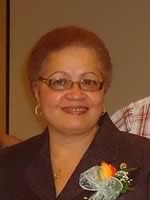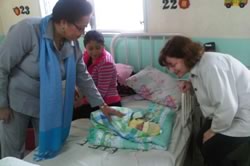
Dr. Gina Watson.
I am a woman, a physician, with a Master of Public Health for 30 years, and the Pan American Health Organization (PAHO) Representative in Honduras – and a national of Nicaragua. I always knew I wanted to work in Latin America, and I choose to work with PAHO because of their close link to national authorities – but, most importantly, for their ability to help me see the reality and the impact of my work at local and community levels.
30 years ago I saw the effect of polio outbreaks across Central America. I saw children who died or were severely disabled by the disease – a completely preventable disease. If only they had received a vaccine they would not have been left disabled for the rest of their lives with lost opportunities for social development, education and jobs.
The immunization program in Honduras has since been a major contributor to reducing infant mortality due to vaccine-preventable diseases. The community has embraced the program and resources from the national government helps ensure that all children are vaccinated, while PAHO through its Vaccine Rotation Fund ensures that prices remain competitive, and that quality is standardized and maintained. I see the results of one of the most successful immunization programs worldwide each day. PAHO helped eradicate polio in Honduras and in the Americas, and we are almost there with measles and other diseases. Every day, we see the power of vaccines helping more children reach milestones in their lives. Vaccines have improved the quality of life for children in Honduras.
As a woman, I am a manager of a technical team, which supports and provides technical cooperation to one of the best vaccination programs in the region. This success is due to the hard work of the committed public health staff of the Ministry of Health, which is made up largely of women: nurses who travel across the country to ensure that vaccines are being provided to all health facilities nationwide and that the services and quality given are up to national standards, and community volunteers that contribute to monitoring and caring for minors, among others.
Part of the success of the immunization program in this country is due to the strong relationship between education and health; health is closely tied with the public school education system – one of the ways that ensures that all children receive their vaccinations. A child’s vaccination card is viewed when they are admitted into schools. Rural and impoverished families are awarded a bonus if their child has their vaccination card up to date and are enrolled in school. This way, parents make sure that their children are vaccinated so they may attend school. Overall, this improves the quality of life and the health of students.

Dr. Watson treats patients in Honduras.
So, why do we feel a huge accountability to vaccinating every child in Honduras? As a woman, mother, and grandmother, I cannot imagine what it would be like raising a child who was a victim of polio. I cannot imagine the hardship of a family with a son or daughter with polio that cannot afford to purchase a wheelchair. These types of decisions should not need to be made by a family in need or any family as a matter of fact.
As we approach International Women’s Day, I am amazed by the strength of the women – the mothers, grandmothers, single mothers, nurses and teachers in these communities. In Honduras, women have a huge role to play in maintaining the health of their family – in addition to managing the home and in many cases also being the sole breadwinner, and holding multiple jobs to support their family. When we look at women, we not only see a family guardian, but also a health provider. It is not a simple role to fill and many women embrace this responsibility to raise a family in the best way possible, while procuring the very best conditions to ensure the lowest possible exposure to poor health conditions. So much is resting on the shoulders of women.
As I said, the immunization program in Honduras is one of the most successful public health programs in our region. Development of this program must be maintained, and we hope that by providing and sharing these good practices, it will continue to be a model that is transferred to other programs around the world.
Finally, before I go, I would like to thank the United Nations Foundation for their recent visit to Honduras. The visit was an opportunity for us to share the success of the National Immunization Program and learn from the perspective of others. It was really an experience and a privilege for us!
Dr. Gina Watson
Each day for a week leading up to International Women’s Day, March 8, Shot@Life will be featuring a “remarkable woman” working to reduce childhood mortality in under-resourced communities in developing countries and/or the U.S. Want to get involved? Visit us on Facebook between now and March 8 to tell us about a remarkable woman who has inspired you.
Continue reading about women who inspire Shot@Life:
- Remarkable. Dedicated. Strong. Global. Women. By Peg Willingham
